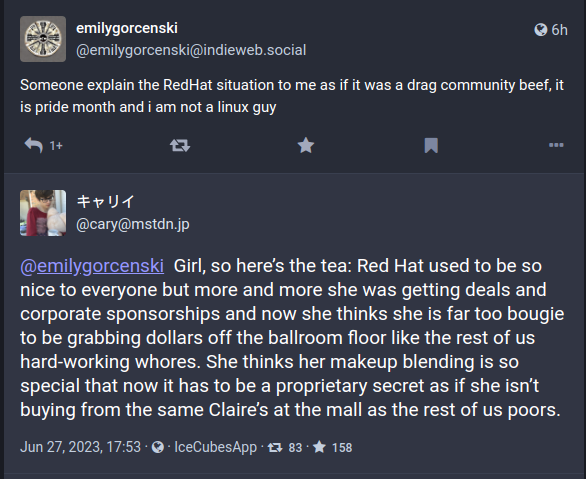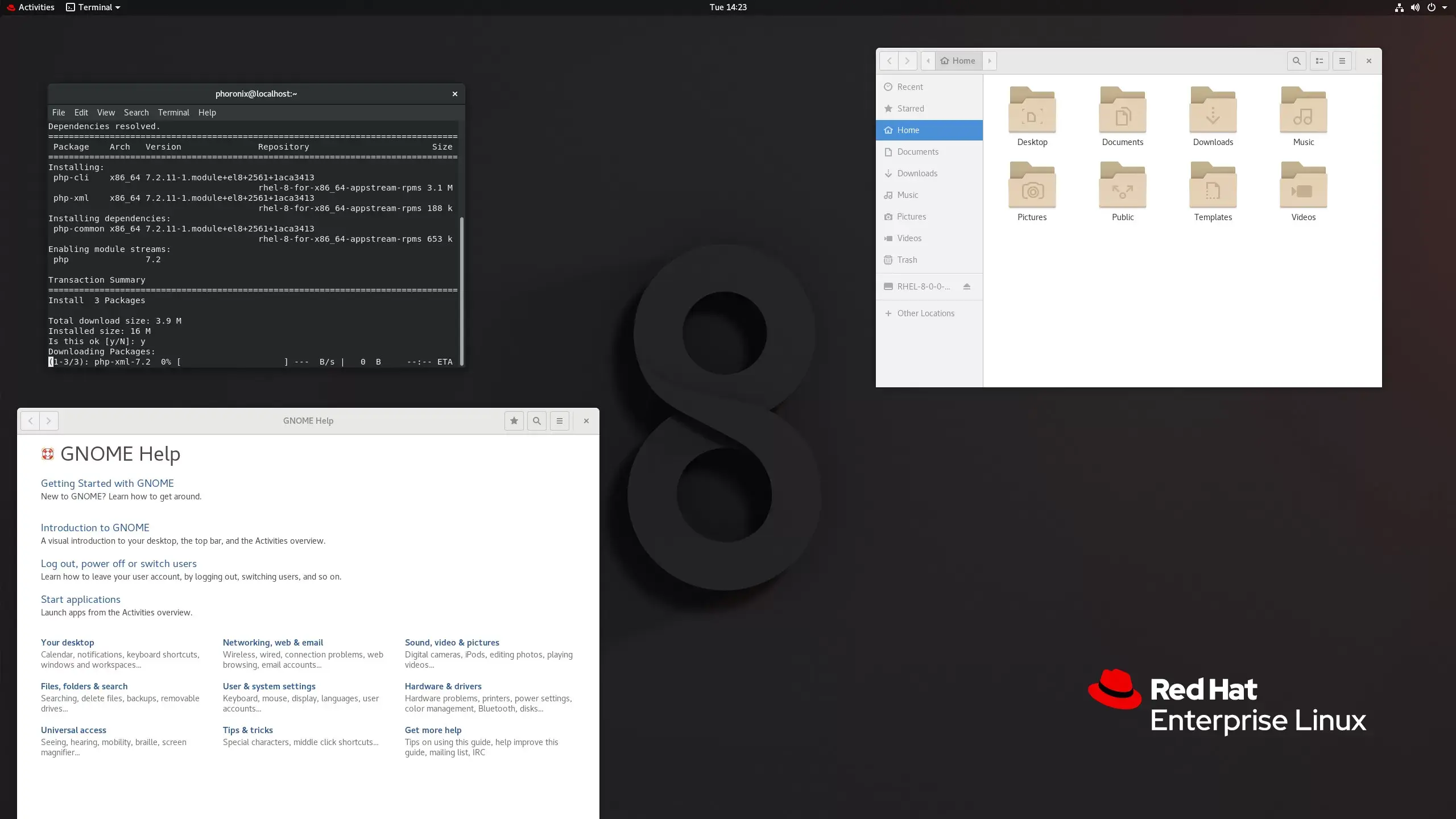… feel that much of the anger from our recent decision around the downstream sources comes from either those who do not want to pay for the time, effort and resources going into RHEL or those who want to repackage it for their own profit. This demand for RHEL code is disingenuous.
Then remove all open source code from your code base. I don’t mean some, I mean all. Let’s see whose code you’re repackaging for your own profit.
I can’t help but notice how similar their phrasing is to Spez trying to justify why Reddit has yanked the rug out from under their third party app developers.
I think the solution is the same.
Spez actually tried to justify it?
I only saw him blaming “power-hungry” moderators for being “greedy”, and apollo “for profiting millions” from reddit’s api.
It’s not surprising. A lot of these CEOs run around in cliques. They have forums, news letters, Chatrooms, and social events. When Silicon Valley Bank went down, the CEO of the company I work for was giving us news from other CEOs he was talking to from a shared Chatroom they set up, basically a discord for CEOs.
The other point is that many CEOs are slaves to trend and have a deep fear of missing out.
In a way, they’re organized, and combined with the above, that’s part of why when one big company hops everyone leaps behind them as if they’re moving as one (it’s all a dick-measuring Highschool clique contest though, which is why I don’t use the word conspiracy). I would not be surprised if Huffman and Musk both repeated their rhetoric to an adoring crowd of fellows before they took it to their feeds. It’s maybe why they speak so brazenly, because there is a little echo chamber of people who worship at the altar of Survivorship bias in the hope that heaven will send them more bigger-dick pills.
I’m not surprised, but that is the most pathetic thing I’ve ever heard.
It’s the classic argument of “your reasonable concerns are detrimental to our business model”
You made this? No. I made this. -Basically every capitalist.
When I say we abide by the various open source licenses that apply to our code, I mean it.
So he’s saying that Red Hat intends to abide by licenses such as the GNU GPL, and yet…
Simply rebuilding code, without adding value or changing it in any way, represents a real threat to open source companies everywhere. This is a real threat to open source…
Red Hat is claiming that redistribution (which is explicitly allowed and encouraged by the GPL) is a threat to open source. They are also threatening to penalize customers who do exercise the rights granted to them by the licenses that Red Hat claims that they will “abide by”.
According to Red Hat the GNU GPL is a threat to open source. And they think this won’t make people angry?
Simply rebuilding code, without adding value or changing it in any way, represents a real threat to open source companies everywhere. This is a real threat to open source…
This is beginning to sound like they’re calling open source piracy.
“Noooo, you can’t copy it. That’s not fair.”
Actually, they’re beginning to sound a lot like Microsoft. It’s their job to complain about FOSS but still contribute.
Hm. Perhaps Red Hat is trying to take Microsoft’s place. In that case…
“Simply ignoring licenses, without acknowledging their terms and dismissing open source practices while still contributing to the FOSS community, represents a threat to closed source companies everywhere. This is a real threat to closed source…”
Yo, Microsoft. Don’t worry about the Activision acquisition. You have new competition to acquire.
Sarcasm aside, this is what we should have expected once they were acquired by IBM. You know, that company which has only ever behaved in an ethical manner for the last… century? Some fun history there. People should read up about it. Especially the '30s and '40s. And then jump to the '80s and '90s where they seem to still be stuck because they’re kind of pulling a “pirates of Silicon Valley” thing here.
This is beginning to sound like they’re calling open source piracy.
No, they’re pointing to things in the past like what Amazon was doing to Elastic, MongoDB, Redis, and others where they (legaly) took the others companies code and made it available in a very simple way an AWS for free so that people would buy other services from AWS instead of paying Elastic and the others - who do do the development job - for hosting the databases. This destroyed their business model so they had to change their licenses from Open Source licenses to closed source licenses. So in this case Red Hat is in the same boat as Elastic and they are right that this is a threat to open source companies everywhere.
edit: Some more background info about this problem: https://techcrunch.com/2018/11/29/the-crusade-against-open-source-abuse/
The GPL doesn’t “encourage” redistribution. It requires it.
Contributing back is besides the point. GPL is infectious, so all of their code which they aren’t releasing the source of is also considered GPL. So unless they release all of the source code they are still non compliant and I have to imagine they’re wel aware of this.
I think they’ll still be compliant as long as they offer their source to customers. The GPL doesn’t require that you make source available to anyone, but to anyone that you distribute binaries to. From the GNU website:
One of the fundamental requirements of the GPL is that when you distribute object code to users, you must also provide them with a way to get the source.
Source: Quick GPLv3 Guide under the More Ways for Developers to Provide Source section.
Of course the GPL also allows redistribution of source code, and Red Hat seems to want to threaten customers who do so.
Yeah, preventing your users from redistribution this is where they might get into trouble and the GPL license would be retracted and thus they would have pirated the software. But someone would need to prove it in court and IBM has a couple of good lawyers.
Maybe I’m missing something; I thought the issue here was that they “aren’t” making their source code available. Just modifications to the original code that can be supplied back to the original source. That doesn’t cover all derivative work though.
GPL only says you have to give the users the source code when they ask for it and you can make them pay for the distribution and they are already doing that so I’m not sure what you mean here.
I’m not a lawyer, and I certainly don’t know the license to that degree, but if true then it seems reasonable for them to stop freely distributing source code and I’m not sure what people are upset about… Sucks to lose something you used to get for free, but hardly an injustice.
Sounds like there’s nothing stopping these derivative distro’s from purchasing the source and continuing on.
Red Hat is saying if you buy a license and then redistribute the code, they will stop selling it to you.
This part is against the GPL, which specifically allows redistribution.
Yeah rip read hat. Thats a big no no in the Linux World…
Man, trying to build a moat around Free Software requires a level of entitlement that is just mind-bending.
Related: Somebody on Mastodon asked to explain to them the RedHat situation as if it was a drag community beef , and as a screenshot for the lazy:

To me everything seems to point to the fact that community developed distros, even if funded by corporations, seems to be the best option moving forward.
From what i get,
It seems like they are pissed at oracle specifically,
Selling a oracle branded rhel clone with minor tweaks and a oracle certified sticker.And the other downstream distros are just collateral damage.
Obviously wouldn’t make it better
(But imo more understandable)The literal point of GPL is that Oracle is explicitly entitled to do exactly that. You don’t own the code.
We had this already with mongodb, Elastic search and AWS. It’s not sustainable to give away your work to your competitors so they can make the money.
Then just write proprietary code. Open source philosophy to me seems about creation for a “greater good”. What’s the point if you’re not even going to be open? The organisation just becomes a massive corporation like any other at that point.
Ugh, fuck it. I’m transitioning my developers to straight-up Debian. I don’t need this shit.
Not surprising that RHEL is now trashing every FLOSS license it’s beholden to. They’ve violated the licenses and I genuinely someone over at GNU or something gets to goosing them with lawyers.
They’ve violated the licenses
Did they? Because as far as I know they’re complying with the GPL and other licenses, since everybody that gets their RHEL license (and the software/binaries) also gets the sources. Or am I mistaken?
I don’t think the license says ‘grant everybody a copy of your source code’, only the ones that actually bought access to the binaries RHEL provides
That’s fine, it’s the threats about terminating support agreements or dev accounts if you redistribute the source code that’s stepping really close or over the line. The license gives you the right (and in some cases the responsibility) to redistribute.
I stopped using rhel/centos after 7 personally, the rolling update seems weird. I’m fine with the AWX model of being the beta testers for the paid product. It is a little different for an OS though as AWX has many features that sometimes are randomly broken on each “release”, but at least there are defined releases. I’m sort of giving up on Redhat, it’s wildly expensive, they have good products but not worth the costs they sell at and I’m tired of trying to constantly navigate this song and dance.
We had rhel at university and I just really couldn’t get warm with it. By that time I’ve used SuSE, Debian and Gentoo at home but somehow it was just to weird :D. On the other side I have no problems with Fedora, so I guess it was just in my head.
Well now, this could be Arch Linux’s moment to shine.
Yes, because I too would definitely use a rolling release disto on a production machine.
that was the joke!
Oh, whoops…
Prime example of Poe’s Law, I guess.
Ooh ooh, let me make some popcorn before I read this!














